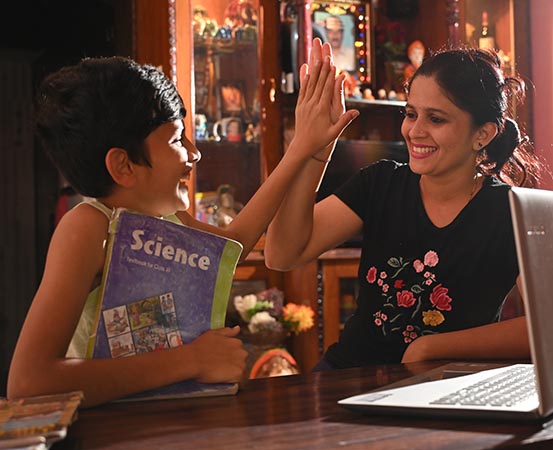
Throwing away the conventional approach of punishment and fear to instill lessons in children, parents are actively trying to adopt gentle parenting. It requires consistent and patient efforts from the parents’ side to get the best of out of this parenting style, while breaking free from a generational approach towards parenting that involves punishment-oriented strictness.
Michelle Callan (30), a manager and a mom from Wicklow, Ireland, says that gentle parenting for her involves acknowledging and validating her daughter’s needs and responding accordingly. “I think gentle parenting helps to raise emotionally connected and secure children,” shares Michelle.
She further adds, “My daughter expresses emotions easily when I am around.” While she believes boundaries and discipline are necessary in parenting, it need not be fear or punishment based.
Happiest Health talks to experts who advise on the best ways to implement this gentler form of parenting.
READ MORE :
Can swimming lessons improve asthma in children?
How to limit screen time for children this summer vacation
Sibling rivalry: What parents need to know
Your child’s slow-paced learning is okay
What is gentle parenting?
According to Harshant Upadhyaya, a counselling psychologist and founder of ‘Way to Hope’ in Mumbai, gentle parenting is about the following values shown towards children:
- Empathy
- Kindness
- Faith
- Respect
- Acceptance
- Dealing with them according to their age
She further adds, “Gentle parenting helps children graduate to the next level of maturity where they have better control over their own selves. They can regulate things better and become their confident selves.”
How punishment and fear affects your child
Negative reinforcements like threats, fear, punishment, force or abuse to inculcate values do not help in internalising the ethics and morals in kids, according to Rekha Ahuja, assistant director, SAMAGRA – St. Joseph’s Holistic Wellness Centre, Bengaluru.
“Instead, parents need to be the living examples of those values, which is what gentle parenting is about,” explains Ahuja.
Upadhyaya says that with punishment-based parenting, children can grow to have low self-esteem and low confidence.
“Harsh parenting severs healthy communication between parents and kids, leading to a hostile relationship between them,” mentions Dr K John Vijay Sagar, head of the department of child and adolescent psychiatry, National Institute of Mental Health and Neuro Sciences, Bengaluru.
Breaking generational rules
Parents exposed to verbal and physical punishment in childhood can impose the same set of rules onto their kids. It takes time and patience to get out of this loop. “Parents can take counselling sessions to help themselves not pass on the same emotional turmoil they went through as kids,” says Upadhyaya.
Anna James Miller (39), director of a funding foundation in California, says that she has opted for gentle parenting to break a generational cycle of emotional abuse. “My parenting style involves micro-affirmations and facilitating self-reflection, instead of punishment and encouraging empathy,” says Anna.
How can you implement gentle parenting?
- Being good role models
Upadhyaya advises that a way of inculcating values in children is to be role models of the behaviours that parents expect their children to exhibit.
- Setting limits
Gentle parenting doesn’t mean you have to be lenient or permissive to an extent that the child will be spoiled, says Ahuja.
“Instead of using harsh and forceful methods to set rules, parents need to explain rules to kids at their level of understanding and provide a structure without making them feel different,” she explains.
Upadhyaya reaffirms, “While parents need to be the safe space for their kids, gentle parenting must come with rules and boundaries. You can’t always behave like a ‘friend’ to your kid.”
- Understanding your child’s needs
Parents should first accept their children as having their own personality with authentic talents. “It starts by respecting your child as a unique individual, who needs to be treated and helped a certain way for them to grow as individuals,” explains Ahuja.
- Not chasing perfection
According to Upadhyaya, instead of structuring a child’s life, parents should help them to structure their own goals. “Allow them to make mistakes and tell them that it’s fine if they screw up because they will always have you to fall back on,” she says.
Takeaways
- Although gentle parenting might seem like it lacks structure, it is about parents giving the necessary tools to help their children– by allowing them to make mistakes and develop their own structure.
- Understanding your child’s needs and being good role models through empathy, respect, kindness and faith will help children grow into secure and confident individuals.

















